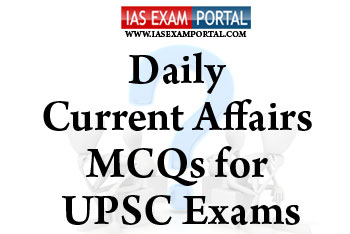(HOT) UPSC Current Affairs 2025 PDF
NEW! The Gist (NOV-2025) | E-BOOKS
Current Affairs MCQ for UPSC Exams - 11 FEBRUARY 2019
Current Affairs MCQ for UPSC Exams - 11 FEBRUARY 2019
Q1. Which of the following statements regarding the open acreage licensing
policy are true ?
1) Open Acreage Licensing Policy (OALP) gives an option to a company looking
for exploring hydrocarbons to select the exploration blocks on its own, without
waiting for the formal bid round from the Government.
2) What distinguishes OALP from New Exploration and Licensing Policy (NELP) of
1997 is that under OALP, oil and gas acreages will be available round the year
instead of cyclic bidding rounds as in NELP.
3) The OALP adopts all features ofHydrocarbon Exploration and Licensing Policy
(HELP) reduced royalty rates, no Oil Cess, uniform licensing system, marketing
and pricing freedom, Revenue Sharing Model etc.
a) 1 & 2 only
b) 2 & 3 only
c) 1 & 3 only
d) all of the above
Q2. Consider the following pairs of international conventions regarding wildlife & environment protection and their respective objectives :
1) Bonn convention :for the Protection of the Ozone Layer
2) Convention on Conservation of Migratory Species (CMS) : To protect the
migratory species throughout their range countries.
3) Ramsarconvention : provides the framework for national action and
international cooperation for the conservation and wise use of wetlands and
their resources.
4) Basel convention :to combat desertification in countries experiencing
seriousdrought
Which of the above pairs are correctly matched ?
a) 1,2& 3 only
b) 2 & 3 only
c) 1,3 & 4 only
d) 2 & 4 only
Q3. The Ministry of Finance, Government of India had set up a dedicated fund called Nirbhaya Fund in 2013, for implementation of initiatives aimed at enhancing the safety and security for women in the country. Which of the following statements regarding the utilisation of Nirbhaya fund are true ?
1) It has been used for setting up of Nirbhaya centres near government
hospital in every district as first point access for victims of sexual assault
and domestic violence.
2) Programme named “SHUBH” for mapping vulnerabilities and identifying areas and
categories of women who need special protection measures such as women in
prostitution or widowed women.
3) The scheme is not widely used for technological or smart phone based security
systems hence majority of young ladies are out of the purview of the final
objective of the scheme.
a) 1 & 2 only
b) 2 & 3 only
c) 1 & 3 only
d) all of the above
Q4. The Government e Marketplace (GeM) and Competition Commission of India (CCI) entered into a Memorandum of Understanding (MoU) to enable a fair and competitive environment in the e-Marketplace.
Which of the following statements with respect to this are true ?
1) GeM is a state-of-the-art national public procurement platform of
Ministry of Commerce and Industries, that has used technology to remove entry
barriers for bonafide sellers and has created a vibrant e-marketplace with a
wide range of goods and services.
2) Competition Commission of India is a statutory body of the Government of
India, responsible for enforcing the Competition Act, 2002 throughout India and
to prevent activities that have an adverse effect on competition.
3) Both CCI and GeM appreciate the importance of advanced analytical tools and
processes for identification of malpractices like cartelization.
a) 1 & 2 only
b) 2 & 3 only
c) 1 & 3 only
d) all of the above
Q5. The newly introduced e-cocoon mobile application serves which of the following purposes ?
a) for enabling farmers to get scheme and market updations regarding coconut
farming .
b) for quality certification in silkworm seed sector.
c) it is a single window clearance system for procurement of scrap material from
government junkyards.
d) it forms a single window clearance system for getting permission for shooting
of films in a city/village.


